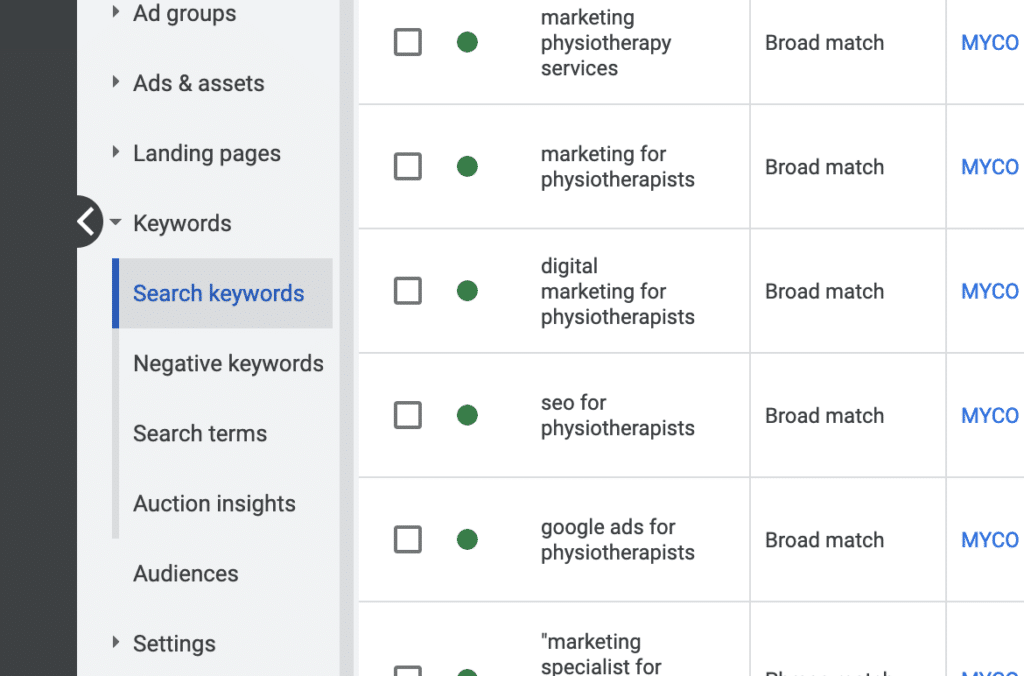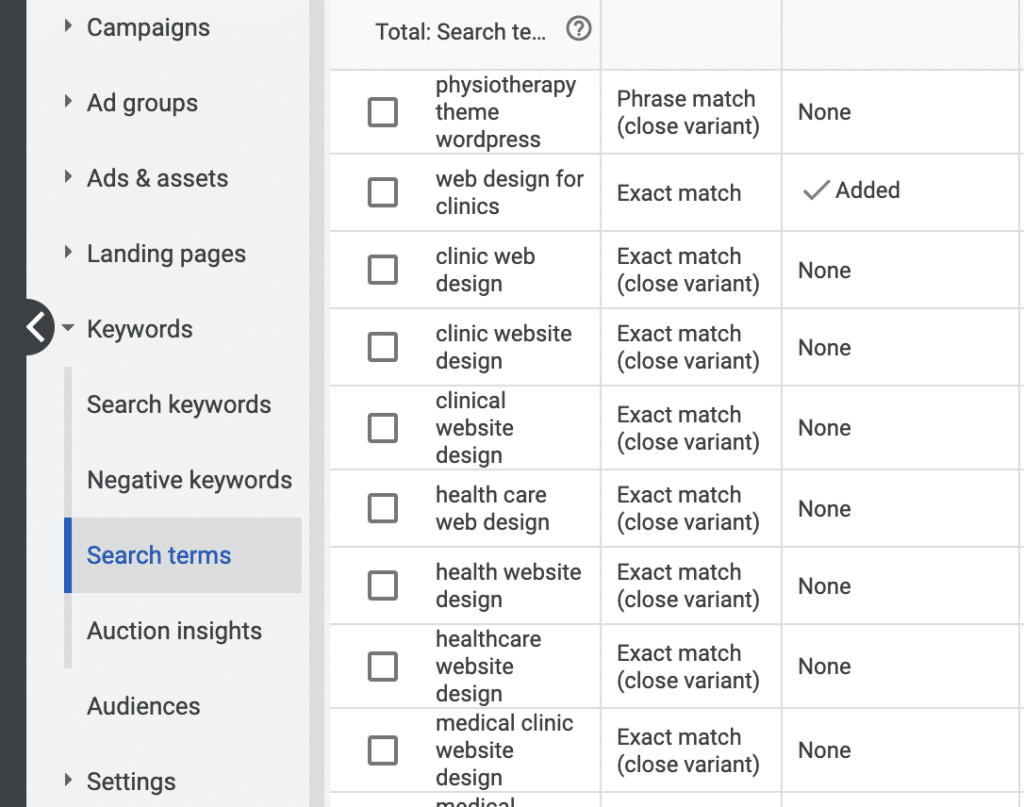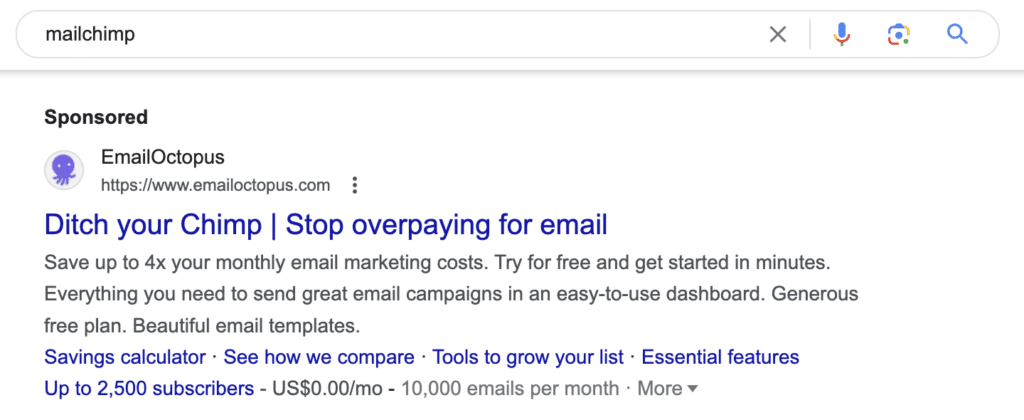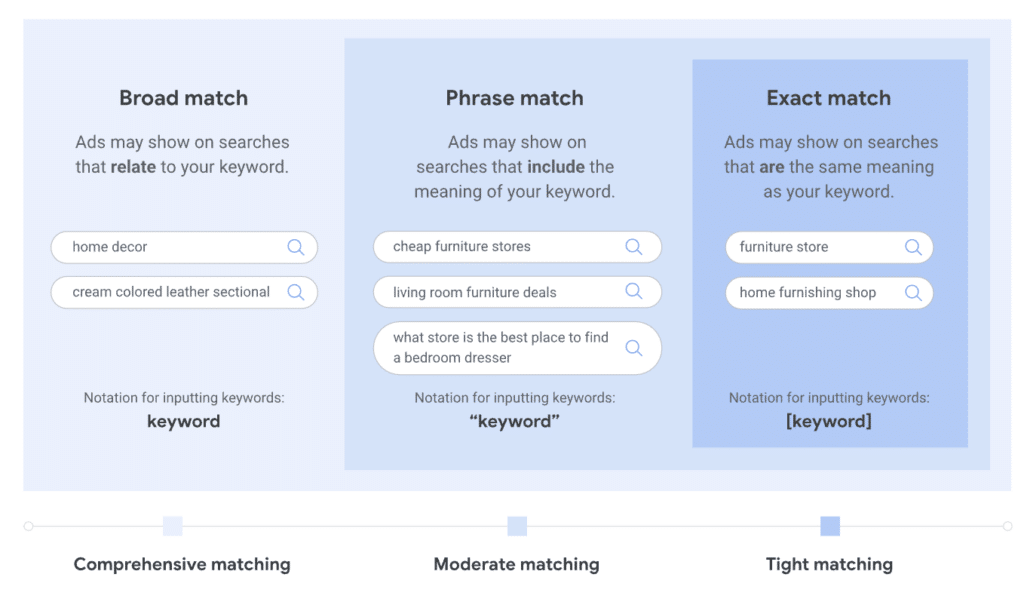Many people new to Google Ads focus on the keywords they want to bid on. In fact, negative keywords (i.e. the ones we don’t want to bid on) are often more important. In this post we’ll look at why that is.
Broad Match and AI Search
The way we use Google Ads has changed over the years. Whereas originally we would be much more specific about the keywords we wanted to bid on, now Google wants to take care of a lot of it for us. Even Google’s match types are now much looser than they used to be:
Originally, “exact match” meant exactly that – that the search phrase had to match exactly the one we had specified. “phrase match” meant that the ad had to include our key phrase, but could include other words as well. Now Google has snuck in the phrase “the meaning of“, giving it more leeway to interpret the phrases we suggest. For broad match, Google can show our ads on anything that it feels relates to our keywords, giving itself carte blanche to make that decision. Google will also always push you towards selecting a broad match search.
This is all part of a general move towards “letting Google do it all for you”. Google feel that (1) their AI is better at making these decisions than most users, and (2) by lowering the bar and letting their software do the thinking, they will encourage more people to use ads.
Why Negative Keywords Are So Important
For the most part, this move to broad match and AI-driven ad decisions is not a bad thing. It does make running ads easier, and also allows us to find search terms to bid on which we might not have thought of ourselves, but which the AI has discovered for us.
However, it also means that Google will show your ads to far more traffic which is simply not interested in what you do. Clicks from these irrelevant searches cost you money, without any chance of actually converting into patients or customers. However, we can’t specify exactly what terms we want our ads to show on in the way we once did, so we have to find a way of weeding out these irrelevant searches.
This is where we use negative keywords. We allow Google to interpret our keywords broadly, whilst checking regularly to see what search terms it is showing our ads on and telling it which ones to not show our ads on.
Finding and Setting Up Your Negative Keywords
In the keywords section of your ads you’ll find various sub-sections. We have the “search keywords” section, which shows what keywords our ads are showing on and the match type we have told Google to use (this is an example from my ads):

If we go to “search terms”, we can see what terms our ads have actually been shown on:

We now have to go through those search terms manually and see what we don’t want to show ads on. For me, the first one is a great example. I don’t want people who want a WordPress theme, I want people who want a website, so I would add “WordPress theme” as a negative keyword. You can do so by going to the “negative keywords” tab and adding it there. Negative keywords also have match types, which you can read more about here. In most cases, a broad match is fine.
What Negative Keywords to Add?
As mentioned, you’ll need to regularly (at least once a week, more at the beginning) look at your search terms to see where your budget might be being wasted and find exactly the right negative terms for you, but there are some common themes between all clinics:
Competitor Names
Some people bid on their competitor names, especially in competitive software niches, as in this search for “Mailchimp”:

However, for a small clinic it’s an unwise strategy. Google’s AI will automatically bid on your competitor names under the philosophy “you’re a dentist, they’re a dentist, so your ad is relevant to someone searching for them”. But when Jane the dentist Googles herself and sees John the dentist bidding on her name, she’s likely to click on his ads until they go away. For me, this outweighs any potential benefit. When you see a competitor’s name in your search terms, best to add it as a negative keyword.
Freebies
‘Free’ is one of the first negative keywords we always add. People looking for something for free are not generally the target of people running Google Ads. You may also want to add things like “cheap”, “low cost”, “budget”, “sale” and so on.

Job Hunters
If you’re bidding on “chiropractor” (for example), you’ll also find your ads appearing for “chiropractor jobs”, “chiropractor vacancies”, “chiropractor salary” and so on. Unless you’re specifically targeting job hunters, add these as negatives too.
Education & Resources
There are a lot of people looking for learning resources, so you’ll want to add things like “book”, “video”, “course”, “tutorial”, “instructional”.
Unrelated Services
Google will interpret what you do quite widely. If your keyword is “psychotherapist”, for example, you may find Google returning your ads for terms like “psychiatrist”, “christian counsellor”, “CBT therapist”, even though you may not offer these services. So look out for services you don’t offer.
At the same time, you may want to keep an eye on whether these terms actually convert. Many osteopaths, chiropractors and physiotherapists bid on each other’s services, and convert profitably because many searchers just want anyone who can treat their problem, not specifically the one they typed in.

Unserviced Geographical Areas
Although it’s impossible to ever stop this entirely, you will find unserviced areas coming up in your search. This is because you may have set your ads to only appear within your area, but when someone in your area of Manchester is planning a trip to London next week and thinking about seeing a dentist while they’re there, they will type in “dentist London” and your ads will show.
Curiosity
A lot of people are just generally interested in what you do and may type in things like:
- Is chiropractic safe?
- How long do dentists train for?
- What is the governing body for psychologists?
A lot of these words like “who” and “how” can be added as negative keywords to prevent people making an informational search from clicking on your ads.
Conclusion
Adding the correct negative keywords are one of the most important parts of modern ad optimisation. But profitable Google Ads are a long-term endeavour. Keep checking your search terms and keep adding negative keywords on a regular basis as part of your ad optimisation routine, and you will see your ads’ profitability grow.

